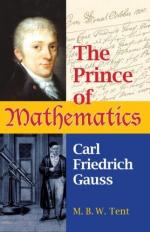|
This section contains 514 words (approx. 2 pages at 300 words per page) |

|
World of Invention on Carl Friedrich Gauss
A true child prodigy, Carl Gauss was a mathematical genius. Born into an extremely poor family in Brunswick, Germany, on April 30, 1777, Gauss amazed his parents by learning to add numbers and make calculations before he was able to talk. He was correcting his father's addition at the age of three. Gauss taught himself to read and, when fourteen years old, received a stipend from Duke Ferdinand of Brunswick to study science. He eventually entered the University of Göttingen in 1795 and obtained his doctorate degree in 1799. Gauss is best known for his mathematical advances. He devised the method of least squares while a teenager; calculated the orbit of the asteroid Ceres , permitting it to be rediscovered after it had been lost; calculated theories of perturbations between the planets, which led to the discovery of Neptune; constructed an equilateral polygon of seventeen sides; and established a non-Euclidean geometry...
|
This section contains 514 words (approx. 2 pages at 300 words per page) |

|


